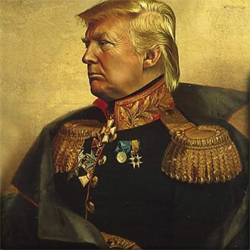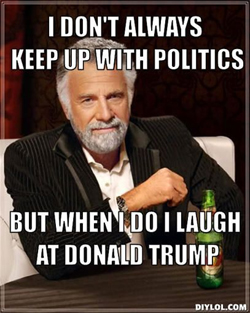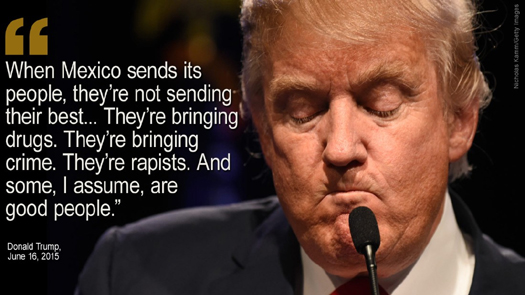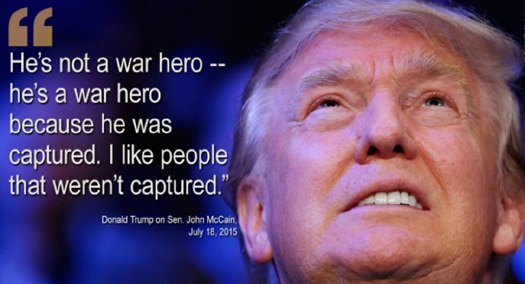Hitch Your Wagon Elsewhere: Donald Trump Simply Isn’t the Epitome of Content Marketing
Donald Trump’s political ascent has spawned countless posts hailing him as content marketing’s Svengali. The rap goes that since Trump has disrupted the Republican establishment and fixated the news media, that he is somehow a model content marketer.
Says who?
HuffPo: The Candidate Content Marketing Built
“his campaign to this point has been a content marketing masterclass.”
Verndale: 5 Ways Donald Trump can Save Your Content Marketing
“Being vague is so underplayed: What are details anyway?”
(yep, Marketing needs more vagueness, I say give me ambiguity or give me something else.)
Marketing Land: “Major brands and political campaigns are very similar when it comes to marketing.” (Sure they are. Focusing on an all-or-nothing race where no one is especially responsible to deliver on promises will probably help US business focus less on long-term sustainable growth.)
Marketo: Make Your Marketing Great Again: 5 Marketing Strategies We Can Learn from Donald Trump: “Being forced to defend your position opens the door for proponents and advocates to fall in love with your brand.” (yep, love is in the air over at the Trump campaign.)
HuffPo again, because they really mean it: Trump: World’s best content marketer.
The closer I look the less that content or marketing seems to be anywhere near The Donald’s wheelhouse. Let me explain.
Trump’s name recognition is most recently rooted in reality television, and before that, a reliable flow of splashy announcements, mixed press and funny pictures. What’s absent is a real content approach pulling together his book, newsletters, recordings, university learning platform, line of office furniture, airline or casinos. Has he built a powerful list? His own media channel? Not really.
Fakery Alone Isn’t Content Marketing
Remember, Trump paid actors to cheer at his campaign announcement. This isn’t the story of building a grassroots brand, its about marshaling the trappings of power at a moment where a bully with notoriety and wealth can pass as a leader in America. This is a time in which skill in government comes with the stain of experience, and the promise of something for nothing passes as a plan.
A Paid Media Wealth Symbol Here’s an alternative frame. Trump’s self-reinventions are connected by notoriety based on being abrasive, self-aggrandizing, and impishly getting away with it. He’s fun to watch. He’s traded his special brand of high profile jackassery for access to traditional media, both as a reality TV star and now as a political candidate.
Here’s an alternative frame. Trump’s self-reinventions are connected by notoriety based on being abrasive, self-aggrandizing, and impishly getting away with it. He’s fun to watch. He’s traded his special brand of high profile jackassery for access to traditional media, both as a reality TV star and now as a political candidate.
Along the way he’s claimed a place in the American imagination as a wealth symbol. Others in this class might include Richard Branson, Christian Grey, Mitt Romney and perhaps the Monopoly Man. Do you have a standard bearer for amazingly rich? For a lot of people it Donald Trump.
This archetype confers a claim to success, which can be leveraged as proof point for leadership. Any number of transgressions that would end a traditional candidate’s campaign slide off Trump to the extent they reinforce his identity as great man despised by smaller envious rivals. That’s usually not a winning hand in national politics, but forces have combined to make this his time.
Political Parties in America Are Having Their Uber Moment
Trump and Bernie Sanders are candidates of their own political moment. Party loyalties have eroded to such a degree that the 47% of American’s who say they are independents swamp the 30% who say they’re Democrats or the 26% who are Republicans. Both men recently stood separate from their parties. If there’s a business lesson, its how quickly brands and unaffiliated voters can be taken over by zealots and outsiders.
Trump and Sanders use a similar formulation: their competitors are beholden to a funding system and party bosses who should be counted among the “others” who have perpetuated the national ills they seek to fix. Trump mixes anger with aggression, while Sanders mixes it with socialism.
Hilary Clinton’s inability to frame the election as the conclusion to a 100 year arch of civil rights for women isn’t due poor content marketing. It’s because the current President was elected on a wave of barrier-breaking euphoria, and that this ocean of independents crave the promise of radical change, not the removal of another symbolic barrier.
A Mere Illusion of Winning
Is content marketing really what’s making Trump a winner? Not as much as Marco Rubio, Ted Cruz and John Kasich. The fact that the Republican vote is split between Trump and three vice president level candidates, gives him a distorted influence. Most of Trump’s state primary victories have happened with levels of support in the thirties. In a four way race that’s a winning hand; in a two way general election it isn’t. Everyone likely to vote for Trump is doing it now. Trump may be unstoppable within the smallest major party, but that is the limit of his invincibility.
Ironically, the possibility of a brokered convention is an incentive for every candidate with delegates to stay in the race and gain more delegates to improve their position for convention deal-making. So splitting the GOP vote seems likely to continue and to create a spiral that cements Trump as a leader if not the presumptive nominee.
With Trump’s HUGE negatives, few down-ticket candidates will want to associate with him. And after being attacked by GOP party elders, Trump is likely to do little to aid their candidates. Voters are mad as hell, and in Trump’s nomination they’re putting a cherry bomb in the mouth of the body politic. The GOP is resisting its reflex to swallow.
A Face in the Crowd – go watch this now
In this post-Citizens United world, Trump is the man who can’t be bought. The self-funded truth teller, who heroically mixes the force of an autocrat with naiveté of an everyman. If you look back to 1957 you can see something close to this played out in Elia Kazan’s A Face in the Crowd. Andy Griffith plays a media-made mix of Adolph Hitler and Arthur Godfrey, which in light of Trumps candidacy seems prescient. And yes, that’s a sexy doe-eyed Patricia Neil as his producer.

The postmodern candidacy of Donald Trump is short on policy, but rich in sentiment. He is emotionally aligned with a portion of American’s who are on the losing side of income equality. They see two America’s, one in which privilege affords influence and success, and the other side of the equation where disadvantage falls so heavily on lower wealth groups that the effect of inequality is evident even in reduced longevity.
The thesis of Trumps campaign is that America’s problems are the fault of others. The finger of Trump’s blame has pointed to trading partners, immigrants, Native Americans and of course hapless political figures who in contrast to him are losers. His resulting program is can be summed up as “Let’s make them pay”. For Sanders, the ‘others’ include the rich and certain kinds of stock traders.
The ability of either of these candidates to accomplish what they call for is beside the point to many supporters. Simply calling people out and making directional promises that align with voter hopes differentiates them from the incumbent favorites.
Friends, Political Campaigns Make Poor Business Examples Most companies want to be in business, creating value a year from now. The totally disposable nature of campaigns, and the win-or-die imperative that comes with them, makes them a poor source for business and marketing lessons.
Most companies want to be in business, creating value a year from now. The totally disposable nature of campaigns, and the win-or-die imperative that comes with them, makes them a poor source for business and marketing lessons.
Bringing business chops to politics might be more valuable. For instance, consider Steven Covey’s first imperative, to start with the end in mind. Does someone who really wants to win a general election insult the demographic group that handed his party their last defeat? Trump has actively crapped on every GOP candidate back to Ronald Reagan.
Mr. Trump may love to win. But in this historic moment, his market approach feels more like the political equivalent of the Pet Rock back in the seventies. A provocative product that is suited for its moment, but which after the mania leaves people unable to recall exactly how this made sense at all.
Democracy’s curse: we get the candidates we deserve
My answer to the hashtag #GetElectedIn3Words is “Someone Else Pays”. That’s a claim both parties insurgents make. Famous TV advertising lawyer, Jim Sokolove, once explained to me that his magic wasn’t advertising, or earned coverage, or the cases we landed by social media or his YouTube fame – it’s that his core promise was “Free Money” to people who were hurt and often desperate.
Whether from abrasive millionaire in a toupee, or a long-haired Democratic Socialist, the promise of free money is hard to resist.
As long as we’re in a low growth economy with static population levels and an aging work force, that may be the best we can hope for, emotionally aligned promises and content marketing. Neither of these in themselves is the source of long-term value. No business epitomes here, and November seems a long way off.



 The future of digital experiences will be built by strategists who grasp the full array of emerging business, social, and technical models. Specialties in user experience, branding, application design, and data science are laying the foundation for richer user experiences and business models breakthrough products and revenue based marketing.
The future of digital experiences will be built by strategists who grasp the full array of emerging business, social, and technical models. Specialties in user experience, branding, application design, and data science are laying the foundation for richer user experiences and business models breakthrough products and revenue based marketing.
2 Responses to "Hitch Your Wagon Elsewhere: Donald Trump Simply Isn’t the Epitome of Content Marketing"
October 9, 2016
[…] sidle toward the spotlight on Trump’s carefully claiming not to endorse him politically – while fawning over how he is the epitome of their own profession, be it: Public Relations, Content Marketing, or leadership. I jokingly imagine the same people in […]
July 18, 2019
[…] celebrating Mr. Trump as a master content marketer was […]